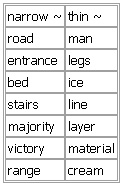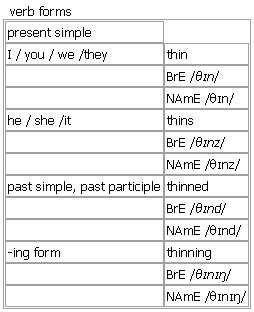|
Từ điển Oxford Advanced Learner 8th
 thin
thin

thin [thin thins thinned thinning] adjective, adverb, verb BrE [θɪn] NAmE [θɪn]
adjective (thin·ner, thin·nest)
NOT THICK
1. having a smaller distance between opposite sides or surfaces than other similar objects or than normal
• Cut the vegetables into thin strips.
• A number of thin cracks appeared in the wall.
•The body was hidden beneath a thin layer of soil.
•a thin blouse (= of light cloth)
see also ↑paper-thin
NOT FAT
2. (of a person or part of the body) (sometimes disapproving)not covered with much flesh
• He was tall and thin, with dark hair.
• She was looking pale and thin.
•He is as thin as a rake (= very thin).
•thin legs
HAIR
3. not growing closely together or in large amounts
•thin grey hair
LIQUID
4. containing more liquid than is normal or expected
Syn: ↑runny
• The sauce was thin and tasteless.
SMOKE
5. fairly easy to see through
• They fought their way through where the smoke was thinner.
AIR
6. containing less ↑oxygen than normal
•Humans would not be able to survive in the thin atmosphere of the planet.
SOUND
7. (disapproving)high and weak
•Her thin voice trailed off into silence.
SMILE
8. not sincere or enthusiastic
•He gave a thin smile.
LIGHT
9. not very bright
•the thin grey light of dawn
POOR QUALITY
10. of poor quality; lacking an important quality
•a thin excuse (= one that people are not likely to believe)
•Their arguments all sound a little thin to me.
•The general standard of applicants is pretty thin this year.
more at thick/thin on the ground at ↑ground n., walk/tread a fine/thin line at ↑line n., spread yourself too thin at ↑spread v., through thick and thin at ↑thick adj., wear thin at ↑wear v.
Word Origin:
Old English thynne, of Germanic origin; related to Dutch dun and German dünn, from an Indo-European root shared by Latin tenuis.
Synonyms:
narrow / thin
These adjectives are frequently used with the following nouns:
Narrow describes something that is a short distance from side to side. Thin describes people, or something that has a short distance through it from one side to the other.
Thin is also used of things that are not as thick as you expect. Narrow can be used with the meanings ‘only just achieved’ and ‘limited’.
Vocabulary Building:
Saying that somebody is thin
Thin is the most usual word: ▪ Steve is tall and thin and has brown hair. It is sometimes used with a negative meaning: ▪ Mother looked thin and tired after her long illness.
The following words all express praise or admiration:
Slim means pleasantly thin. It is often used to describe women who have controlled their weight by diet or exercise: ▪ She has a beautifully slim figure.
A slender girl or woman is thin and graceful.
A lean man is thin and fit.
Willowy describes a woman who is attractively tall and thin.
The following words are more negative in their meaning:
Skinny means very thin, often in a way that is not attractive: ▪ a skinny little kid.
Bony describes parts of the body when they are so thin that the bones can be seen: ▪ the old man’s bony hands.
Scrawny suggests that a person is thin, weak and not attractive: ▪ a scrawny old woman.
Gaunt describes a person who is a little too thin and looks sad or ill.
Underweight is used in medical contexts to describe people who are too thin because they are ill or have not had enough food: ▪ Women who smoke risk giving birth to underweight babies.
Emaciated describes a serious condition resulting from illness or lack of food.
Anorexic is a medical term, but is now also used informally to describe a girl or woman who is so thin that you are worried about them.
It is more acceptable to talk to somebody about how thin or slim they are than about how fat they are.
note at ↑fat
Example Bank:
•He's getting a little thin on top= losing his hair.
•His knowledge of the country was somewhat thin.
•His management team was stretched thin.
•How do you manage to stay so thin?
•Jobs were still a bit thin on the ground= not many were available.
•My patience is running thin.
•She's tall and quite thin.
•That joke is wearing a little thin.
•The evidence seems awfully thin.
•The fabric was wearing thin.
•The old horse was painfully thin.
•The paint looks a bit thin.
•The team is dangerously thin at wide receiver.
•You can spread yourself too thin, often leading to poor choices.
•a plate of wafer-thin bread and butter
•a sliver of rock thin enough to be translucent
•He is as thin as a rake.
•She pinched her thin lips together.
•The wind blew cold through his thin shirt.
•narrow/thin shoulders/strips/cracks
Idioms: disappear/vanish into thin air ▪ ↑have a thin time ▪ ↑out of thin air ▪ ↑skating on thin ice ▪ ↑thin end of the wedge ▪ ↑thin on top ▪ ↑thin skin
Derived Word: ↑thinness
adverb (thin·ner, thin·nest)
in a way that produces a thin piece or layer of sth
•Don't spread it too thin.
•I like my bread sliced thin.
Word Origin:
Old English thynne, of Germanic origin; related to Dutch dun and German dünn, from an Indo-European root shared by Latin tenuis.
verb (-nn-)
LIQUID
1. transitive ~ sth (down) (with sth) to make a liquid less thick or strong by adding water or another substance
•Thin the paint with water.
OF HAIR
2. intransitive to become less thick
•a middle-aged man with thinning hair
BECOME LESS THICK
3. intransitive, transitive to become less thick or fewer in number; to make sth less thick or fewer, for example by removing some things or people
•The clouds thinned and the moon shone through.
•Global warming could be accelerated due to the thinning of the ozone layer.
•~ out The crowd had thinned out and only a few people were left.
•~ sth (out) Thin out the seedlings to about 10cm apart.
Verb forms: 
Word Origin:
Old English thynne, of Germanic origin; related to Dutch dun and German dünn, from an Indo-European root shared by Latin tenuis.
Example Bank:
•Gradually the crowd thinned to a narrow trickle.
•His hair was long at the sides but thinning on top.
•If the soup is too thick, thin it down with a little milk.
•The traffic was beginning to thin out.
•Thin the paint with white spirit.
|
|
|
▼ Từ liên quan / Related words
Related search result for "thin"
|
|
